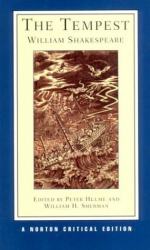|
This section contains 6,139 words (approx. 21 pages at 300 words per page) |

|
SOURCE: "Calvin and Caliban: Naming the 'Thing of Darkness'," in The University of Dayton Review, Vol. 21, No. 1, Spring, 1991, pp. 131-44.
In the following essay, Crockett argues that although Caliban initially appears to be emblematic of human corruption, midway through the play he begins to demonstrate a capacity for self reformation, and at the end of the drama he is truly penitent. Underlying the characterization of Caliban, the critic maintains, is Shakespeare's mockery and rejection of the rigid Calvinist doctrine of predestination.
Shakespeare's Caliban has received a strikingly varied body of critical interpretation, from John C. McCloskey's treatment of the character as a "savage clown" and a "Commedia dell'arte buffoon" (345) to Frank Kermode's agreement with Prospero's assessment: Caliban is "a born devil" (xl). More recently, revisionist commentators have stressed a relatively helpless Caliban's victimization at the hands of an imperialistic Prospero.1 Corona Sharp has gone so far as to...
|
This section contains 6,139 words (approx. 21 pages at 300 words per page) |

|


